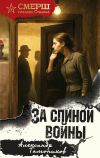Читать книгу "Английский язык"

Автор книги: Виктория Мороз
Жанр: Прочая образовательная литература, Наука и Образование
сообщить о неприемлемом содержимом
As his position grew more responsible, his business connections increased, and gradually he was becoming quite a personage. He already knew a number of rich businessmen who dealt with the bank where he worked. The brokers considered him to be a most reliable person.
Young Cowperwood took an interest in his father's progress. From seeing his father count money, he was sure that he would like banking, and Third Street, where his father's office was, seemed to him the cleanest, most fascinating street in the world. He was quite often allowed to come to the bank on Saturdays, when he could watch with great interest the quick exchange of bills. He wanted to know where all the types of money came from, why discounts were demanded and received, and what the men did with all the money they received. His father, pleased at his interest, was glad to explain so that even at this early age – from ten to fifteen – the boy gained a wide knowledge of the condition of the country financially. He was also interested in stocks and bonds, and he learned that some stocks and bonds were not even worth the paper they were written on, and others were worth much more than their face value showed.
At home he also listened to considerable talk of business and financial adventure.
Frank realized that his father was too honest, too careful. He often told himself that when he grew up, he was going to be a broker, or a financier, or a banker, and do some of the risky things he so often used to hear about.
Just at this time there came to the Cowperwoods an uncle, Seneca Davis – Henry Cowperwood was pleased at the arrival of this rather rich relative, for before that Seneca Davis had not taken much notice of Henry Cowperwood and his family.
This time, however, he showed much more interest in the Cowperwoods, particularly in Frank.
"How would you like to come down to Cuba and be a planter, my boy?" he asked him once.
"I'm not so sure that I'd like to," replied the boy. "Well, that's frank enough. What have you against it?" "Nothing, except that I don't know anything about it." "Well, what are you interested in ?" "Money!"
"Aha! get something of that from your father! Well, that's a good trait. And speak like a man, too!"
He looked at Frank carefully now. There was real force, in that young body – no doubt of it.
"A clever boy!" he said to Henry, his brother-in-law. "You have a bright family."
Henry Cowperwood smiled. This man, if he liked Frank, might do much for the boy. He might leave him some of his money. He was rich and single.
Uncle Seneca became a frequent visitor to the house and took an increasing interest in Frank.
"When that boy gets old enough to find out what he wants to do, I think I’ll help him to do it," he said to his sister one day. She told him she was very grateful. He talked to Frank about his studies, and found that he cared little for books or most of the subjects he had to take at school.
"I like book-keeping and mathematics," he said. "I want to get out and get to work, though. That's what I want to do."
"You are very young, my son," his uncle said. "You're only how old now? Fourteen?" "Thirteen."
"Well, you can't leave school much before sixteen. You'll do better if you stay until seventeen or eighteen. It can't do you any harm. You won't be a boy again."
"I don't want to be a boy. I want to get to work."
"Don't go too fast, son. You'll be a man soon enough. You want to be a banker, don't you?"
"Yes, sir."
"Well, when the time comes, if everything is all right and you've behaved well and you still want to, I'll help you get a start in business. If you are going to be a banker, you must work with some good company a year or so. You'll get a good training there. And, meantime, keep your health and learn all you can."
And with these words he gave the boy a ten-dollar gold piece with which to start a bank account.
3.5.1 Vocabulary notes
teller – кассир в банке, банковский служащий
to deal with – заниматься чем-л., иметь дело с кем-л., чем-л.
bill – счет; вексель; амер. банкнота, казначейский билет
discount – скидка
stock – акция, ценные бумаги, облигации
bond – долговое обязательство, облигация
face value – номинальная стоимость
a broker – брокер, маклер; агент; посредник
trait – характерная черта, особенность
book-keeping – бухгалтерский учет
bank account – счет в банке, банковский счет
3.6 Text 6
THE FIRST TRANSACTION
(from «The Financier» by Th. Dreiser)
It was in his thirteenth year that young Cowperwood entered into his first business transaction. Walking along Front Street one day he saw an auctioneer's flag before a grocery and from the interior came the auctioneer's voice: «What price am I offered for this exceptional lot of Java coffee?» The people offered their price. The coffee was quickly sold. At first Cowperwood had no intention to take part in the auction but after he had made a rapid calculation he thought he could make a profit.
"I am going to offer you now a fine lot of seven cases of Castile soap. At this moment this soap costs anywhere 11 dollars and 75 cents a case."
People began to offer their price. The original price was 15 dollars. Then the price reached 30 dollars. Cowperwood's mind was working hard. He took everything into account. Frank was sure he would get a profit, "that's why he decided to participate. When finally Cowperwood offered 32 dollars the auctioneer noticed him standing almost directly under his nose. The solidity of the boy's expression made a great impression on the man. Meanwhile young Cowperwood was thinking that he had no right to buy the soap as he had no money with him. But he was sure that his father who was a teller of the Third National Bank would lend him the money.
"32 – once! 32 – twice! Three times! The soap is sold to Mr…?" The auctioneer looked into the face of the boy.
"Frank Cowperwood, the son of the teller of the Third National Bank,' replied the boy. "Will you wait while I run up to the Bank and get the money?"
"Yes. Don't be long. If you are not here in an hour I'll sell it again."
Young Cowperwood made no reply. He hurried out and ran fast, but first to his mother's grocer.
When he entered the grocer's store he looked about for Castile soap. There it was, the same kind, displayed in a box and looking just as his soap looked.
Mr. Dalrymple, the owner of the store, though very much surprised, agreed to buy the soap offered by Cowperwood on condition that the boy would deliver the goods himself. Frank was sure there would be no difficulty in delivering the soap to the shop. At last they finalized the matter. Cowperwood was to deliver the soap to the shop and the grocer was to give him 62 dollars. So the question was settled to both parties' satisfaction.
Frank hurried out again and ran to his father's bank. The boy knew that his father wouldn't object to his plan.
"What's the trouble, Frank? What's the reason for your coming?" asked his father looking up from his desk when the boy appeared.
Frank explained the situation to him. He assured his father that it was a clear profit of 30 dollars and he would not do anything special. It was a good opportunity and he was not going to miss it.
Cowperwood senior, approved Frank's plan. Moreover it was not even necessary to instruct him how to act. This was the most business – like attitude he saw in his son. And Frank's father appreciated it very much. Frank was so bright and keen for a boy of 13. So the father counted out 32 dollars. Frank ran out of the building and returned to the auction premises as fast as his legs could carry him. He paid for the soap and it was not a problem for him to cover little transportation expenses.
In an hour he was before the door of Mr. Dalrymple's store with the soap. The owner paid for the goods and thought to himself it was most incredible for such a boy to be in business.
Since that transaction Frank Cowperwood decided to devote his life to business.
3.6.1 Vocabulary notes
to enter into a transaction – заключать сделку
to offer a price – предлагать цену
to take part in the auction – участвовать в аукционе
original price – первоначальная цена
to take into account – принимать во внимание, в расчет
to get a profit – получать прибыль
solidity – твердость
on condition that – при условии
to deliver goods – доставлять груз; поставлять товар
premises – помещение, здание, дом; недвижимость
to cover transportation expenses – покрывать транспортные расходы
to be in business – заниматься торговлей
3.7 Text 7
MY FINANCIAL CAREER
(by Stephen Leacock)
When I go into a bank I get rattled. The clerks rattle me; the wickets rattle me; the sight of the money rattles me; everything rattles me.
The moment I cross the threshold of a bank and attempt to transact business there, I become an irresponsible idiot.
I knew this beforehand, but my salary had been raised to fifty dollars a month and I felt that the bank was the only place for it.
So I shambled in and looked timidly round at the clerks. I had an idea that a person about to open an account must consult the manager.
I went up to a wicket marked "Accountant." The accountant was a tall, cool devil. The very sight of him rattled me. My voice was sepulchral.
"Can I see the manager?" I said, and added solemnly, "alone." I don't know why I said "alone."
"Certainly," said the accountant and fetched him.
The manager was a grave, calm man. I held my fifty-six dollars clutched in a crumpled ball in my pocket.
"Are you the manager?" I said. God knows I didn't doubt it. "Yes," he said.
"Can I see you," I asked, "alone?" I didn't want to say "alone" again, but without it the thing seemed self-evident.
The manager looked at me in some alarm. He felt that 1 had an awful secret to reveal.
"Come in here," he said and led the way to a private room. He turned the key in the lock.
"We are safe from interruption here," he said. "Sit down."
We both sat down and looked at each other. I found no voice to speak.
"You are one of Pinkerton's men, I presume," he said. He had gathered from my mysterious manner that I was a detective. I knew what he was thinking, and it made me worse.
"No, not from Pinkerton's," I said, seeming to imply that I came from a rival agency.
"To tell the truth," I went on, as if I had been prompted to lie about it, "I am not a detective at all. I have come to open an account. I intend to keep all my money in this bank."
The manager looked relieved but still serious; he concluded now that I was a son of Baron Rothschild.
"A large account, I suppose," he said.
"Fairly large," I whispered. "I propose to deposit fifty-six dollars now and fifty dollars a month regularly."
The manager got up and opened the door. He called to the accountant.
"Mr. Montgomery," he said loudly, "this gentleman is opening an account, he will deposit fifty-six dollars. Good morning."
I rose.
A big iron door stood open at the side of the room. "Good morning," I said and stepped into the safe.
"Come out," said the manager coldly and showed me the other way.
I went up to the accountant's wicket and poked the ball of money at him with a quick convulsive movement as if I were doing a conjuring trick.
My face was ghastly pale.
"Here," I said, "deposit it." The tone of the words seemed to mean, "Let us do this painful thing while the fit is on us."
He took the money and gave it to another clerk.
He made me write the sum on a slip and sign my name in a book. I no longer knew what I was doing. The bank swam before my eyes.
"Is it deposited?" I asked in a hollow, vibrating voice. "It is," said the accountant.
"Then I want to draw a cheque."
My idea was to draw out six dollars of it for present use. Someone gave into a cheque-book through a wicket and someone else began telling me how to write it out. The people in the bank had the impression that I was invalid millionaire I wrote something on the cheque and thrust it in at the clerk. He looked at it.
"What! Are you drawing it all out again?" he asked in surprise. Then I realized that 1 had written fifty-six instead of six. I was too far gone to reason now. I had a feeling that it was impossible to explain the thing. All the clerks had stopped writing to look at me.
Reckless with misery, I made a plunge. "Yes, the whole thing."
"You withdraw your money from the bank?"
"Every cent of it."
"Are you not going to deposit any more?" said the clerk, astonished. "Never."
An idiot hope struck me that they might think something had insulted me while I was writing the cheque and that I had changed my mind. I made a wretched attempt to look like a man with a fearfully quick temper.
The clerk prepared to pay the money. "How will you have it?" he said. "What?"
"How will you have it?"
"Oh," I caught his meaning and answered without even trying to think: " – in fifties."
He gave me a fifty-dollar bill.
"And the six?" he asked dryly. "In sixes," I said.
He gave it to me and I rushed out.
As the big door swung behind me I caught the echo of a roar of laughter that went up to the ceiling of the bank. Since then I bank no more. I keep my money in cash in my trousers pocket and my savings in silver dollars in a sock [4].
3.7.1 Vocabulary notes
get rattled – терять спокойствие, нервничать
wicket – окошко (кассы)
to transact business – вести дела
to shamble – волочить ноги, тащиться
to open an account – открывать счет
accountant – бухгалтер
sepulchral voice – замогильный голос
to prompt – побуждать, толкать, подсказывать
to draw a cheque – выписывать чек
to withdraw money from а bank – изымать деньги из банка
cash – наличные деньги, наличность
savings – сбережения
4 Part three
4.1 Text 1
IF TOMORROW COMES
After Sidney Sheldon
Tracy Whitney was young, beautiful, intelligent and about to marry into wealth and glamour. She was on top of the world. Until suddenly, betrayed by her own innocence, she was in prison, framed by a ruthless Mafia gang, abandoned by the man she loved.
Beaten and broken, but kept going by her dazzling ingenuity, Tracy emerged from her savage ordeal determined to revenge herself on those who had destroyed her life and to fight back against a society that denied her success and happiness. No one would ever cheat her again.
From New Orleans to London and on to Paris, Madrid and Amsterdam, with intelligence and beauty her only weapons, Tracy played for the highest stakes in a deadly game, matching her wits against the successful and the unscrupulous.
Only one man can challenge her. He’s handsome and persuasive and just as daring. And only one man can stop her. An evil genius who shadows her every move – a man whose only hope of salvation is Tracy’s destruction…
Tracy met Charles Stanhope at a financial symposium where Charles was the guest speaker. He ran the investment house founded by his great-grand-father, and his company did a good deal of business with the bank Tracy worked for. After his lecture, Tracy went up to disagree with his analysis of the ability of third-world nations to repay the staggering sums of money they borrowed from commercial banks worldwide and western governments. Charles at first was amused then intrigued by the impassioned arguments of the beautiful young woman before him. Their discussion continued through dinner at the old Bookbinder’s restaurant.
In the beginning, Tracy was not impressed with Charles Stanhope even though she was aware that he was considered Philadelphia’s prize catch. Charles was thirtyfive and a rich and successful member of one of the oldest families in Philadelphia. Five feet ten inches, with thinning sandy hair, brown eyes, and an earnest, pedantic manner, he was, Tracy thought, one of the boring rich.
As though reading her mind, Charles leaned across the table and said, “My father is convinced they gave him the wrong baby at the hospital.”
“What?”
“I’m a throwback. I don’t happen to think money is the end-all and be-all of life. But please don’t ever tell my father I said so.”
There was such a charming unpretentiousness about him that Tracy found herself warming to him. I wonder what it would be like to be married to someone like him – one of the establishment. And what am I going on about like an idiot?
Talk about ego. A man asks me out to dinner and I’m deciding whether I want to marry him. We’ll probably never even see each other again.’ Charles was saying, “I hope you’re free for dinner tomorrow…?” Philadelphia was a dazzling cornucopia of things to see and do. On Saturday nights Tracy and Charles went to the ballet or watched Riccardo Muti conduct the Philadelphia Orchestra. During the week they explored New Market and the unique collection of shops in Society Hill. They ate cheese steaks at a pavement table at Geno’s and dined at the Cafe Royal, one of the most exclusive restaurants in Philadelphia. They shopped at Head House Square and wandered through the Philadelphia Museum of Art and the Rodin Museum.
4.1.1 Vocabulary notes
guest speaker – приглашенный докладчик
to run – управлять, руководить
investment house – инвестиционная компания
to found – основать
ability – способность, возможность
staggering sums of money – огромные суммы денег
to be aware – понимать, осознавать
to consider – рассматривать
to convince – убеждать
to wonder – хотеть знать
to wander – бродить
leisure – досуг
cornucopia – рог изобилия
4.1.2 Fill in the gaps with the following prepositions: with, by, of, from, after, in
1 His company did a good deal … business … the Philadelphia Trust and Fidelity Bank.
2 The investment house was founded … his great-grandfather.
3 Third-world nations borrow money … commercial banks worldwide and western governments.
4 … the beginning Tracy was not impressed … Charles Stanhope. 5 … Charles’s lecture Tracy went up to disagree with his analysis.
4.1.3 Fill in the gaps with the following words: beautiful, at first, financial, business, investment, successful
1 Charles was amused, then intrigued.
2 Tracy was a … woman of her mid-twenties with lovely, intelligent face. 3 Tracy met Charles at a… symposium.
4 Charles was a rich and … member of one of the oldest families in Philadelphia.
5 Charles ran the … house.
6 His company did a good deal of… with the bank Tracy worked for.
4.1.4 Answer the questions
1 Where did Tracy meet Charles Stanhope?
2 What company did Charles Stanhope run?
3 What bank did Charles’ company do a good deal of business with?
4 Why did Tracy go to Charles Stanhope after his lecture at the financial symposium?
5 What sums of money did third-world nations borrow from commercial banks worldwide and western governments?
6 How did Tracy and Charles spend their leisure?
4.1.5 What do you think about the main characters of the extract?
4.1.6 What is in store for Tracy and Charles?
4.1.7 Make up a dialogue between Tracy and Charles
– After his presentation at the financial symposium in the bank Tracy worked for;
– During dinner at the restaurant.
4.1.8 Describe the appearance of: a) Charles; b) Tracy
4.1.9 Write five sentences using the following expressions: financial symposium; to run the investment house; to disagree with; to do a good deal of business; to repay the staggering sums of money
4.2 Text 2
IF TOMORROW COMES
After Sidney Sheldon (to be continued)
As Tracy approached the bank, she glanced at her watch. Eight-twenty.
The doors of the Philadelphia Trust and Fidelity Bank would not be open to employees for another ten minutes but Clarence Desmond, the bank’s senior vicepresident in charge of the international department, was already turning off the outside alarm and opening the door. Tracy enjoyed watching the morning ritual. She stood in the rain waiting as Desmond entered the bank and locked the door behind him.
Banks the world over have arcane safety procedures and the Philadelphia Trust and Fidelity Bank was no exception.
Clarence Desmond was checking the lavatories, storeroom, safe-deposit area. Only when he was fully satisfied that he was alone would the Venetian blind be raised as a sign that all was well.
The senior bookkeeper was always the first of the employees to be admitted. He would take his place next to the emergency alarm until the other employees were inside then lock the door behind them.
Tracy smiled and went to work. She was in charge of the cable-transfer department. Until recently the transfer of money from one bank to another and from one country to another had been a slow, laborious process requiring multiple forms to be filled out and dependent on national and international postal services. With the advent of computers the situation had changed dramatically and enormous amounts of money could be transferred instantaneously. It was Tracy’s job to extract overnight transfers from the computer and to make computer transfers to other banks. All transactions were in code, changed regularly to prevent unauthorized access. Each day millions of electronic dollars passed through Tracy’s hands. It was fascinating work, the life-blood that fed the arteries of business all over the globe, and until Charles Stanhope the Third had come into Tracy’s life, banking had been the most exciting thing in the world for her. The Philadelphia Trust and Fidelity Bank had a large international division and at lunch Tracy and her fellow workers would discuss each morning’s activities. It was heady conversation.
Deborah, the head bookkeeper, announced: “We just closed the hundredmillion-dollar syndicated loan to Turkey…”
Mae Trenton, secretary to the vice-president of the bank, said in the confidential tone: “At the board meeting this morning they decided to join the new money facility to Peru. The up-front fee is over five million dollars…”
John Creighton added: “I understand we’re going in on the Mexican rescue package for fifty million. Those wetbacks don’t deserve a damned cent…”
“It’s interesting,” Tracy said thoughtfully, “that the countries that attack America for being too money-oriented are always the first to beg us for loans.”
It was the subject on which she and Charles had their first argument.
4.2.1 Vocabulary notesto be in charge of the department – возглавлять отдел alarm – зд. Сигнализация arcane safety procedures – система сигнализации storeroom – склад safe-deposit area – место для сейфов senior – старший bookkeeper – бухгалтер employee – служащий to transfer – пересылать
4.2.2 Fill in the gaps with the necessary words: fully, except, besides, safedeposit, employees, the world over, exception.
1 There are many different banks in the USA … the Philadelphia Trust and Fidelity Bank.
2 The routine never varied, … for the security signal.
3 When Clarence Desmond was … satisfied that he was alone the Venetian blind would be raised as a sign that all was well.
4 Banks … have arcane safety procedures, and Philadelphia Trust and Fidelity Bank was no …
5 Clarence Desmond checked the lavatories, storeroom, … area.
6 The senior bookkeeper was always the first of the … to be admitted.
4.2.3 Fill in the blanks with the necessary preposition: of for, at
1 The bank would not be open … another ten minutes.
2 As Tracy approached … the bank she glanced … her watch.
3 Clarence Desmond was in charge … the international department. 4 Tracy enjoyed … watching the morning ritual. 5 Desmond entered … the bank.
4.2.4 Find answers in the text
1 What was Clarence Desmond?
2 What department was Clarence Desmond in charge of? 3 What was Tracy Whitney?
4 What bank did Tracy work for? 5 What was Deborah?
6 What was Mae Trenton?
7 What was John Creighton?
4.2.5 Write five sentences using the following word combinations: to approach the bank, to be admitted to, to be fully satisfied with, senior bookkeeper, to make certain
4.2.6 Make up the dialogue between Tracy and her colleagues during dinner
4.2.7 Translate the sentences into Russian paying attention to the infinitive constructions
1 The decision is sure to be adopted tomorrow and we might get acquainted with it.
2 I insist you send us the catalogues, price-lists and other documents.
3 The Home Secretary is expected to make a statement next week on the provisional agreement.
4 An attempt to cover up the differences which came to the surface last weekend will be made by both Ministers in talks expected to take place at the end of next month.
5 I heard them have agreed upon all the main problems and they are looking forward to a new contract to be concluded with us.
6 This decision is considered to be of decisive importance for those branches of industry to which it refers.
7 The questions raised in your letter are likely to be discussed during the private meeting.
8 The ship is likely to arrive at the port tomorrow morning, we might be informed of it.
4.3 Text 3
IF TOMORROW COMES
After Sidney Sheldon (to be continued)
There are numerous illegal ways to gain entry to a computer and Tracy was an expert. She had helped set up the security system at the Philadelphia Trust and Fidelity Bank, and now she was about to circumvent it.
Her first step was to find a computer shop where she could use a terminal to tap into the bank’s computer. The shop some distance from the bank was almost empty.
An eager salesman approached Tracy. “May I help you, miss?”
“Thanks. I’m just looking.”
His eye was caught by a teenager playing a computer game. “Excuse me.” He hurried away.
Tracy turned to the desk-model computer in front of her, which was connected to a telephone. Getting into the system would be easy, but without the proper access code, she was stymied, and the access code was changed daily. Tracy had been at the meeting when the original authorization code had been decided on.
“We must keep changing it,” Clarence Desmond had said, “so no one can break in; yet we want to keep it simple enough for people who are authorized to use it.”
The code they had finally settled on used the four seasons of the year and the current day’s date.
Tracy turned on the terminal and tapped out the code for the Philadelphia Trust and Fidelity Bank. She heard a high-pitched whine and placed the telephone receiver into the terminal modem. A sign flashed on the small screen: YOUR AUTHORIZATION CODE, PLEASE?
Today was the tenth.
AUTUMN 10, Tracy tapped out.
THAT IS AN IMPROPER AUTHORIZATION CODE. The computer screen went blank.
Had they changed the code? Out of the corner of her eye, Tracy saw the salesman coming towards her again. She moved over to another computer, gave it a casual glance. The salesman checked his stride. A looker, he decided. He hurried forward to greet a prosperous-looking couple coming in the door. Tracy returned to the desk-model computer.
She tried to put herself into Clarence Desmond’s mind. He was a creature of habit, and Tracy was sure he would not have varied the code too much. He had probably kept the original concept of the seasons and the numbers, but how had he changed them? It would have been too complicated to reverse all the numbers, so he had probably shifted the seasons around.
Tracy tried again.
YOUR AUTHORIZATION CODE, PLEASE?
WINTER 10.
THAT IS AN IMPROPER AUTHORIZATION CODE. The blank screen again. It’s not going to work, Tracy thought despairingly. I’ll give it one more try.
YOUR AUTHORIZATION CODE, PLEASE?
SPRING 10.
The screen went blank for a moment, and then the message appeared: PLEASE PROCEED.
So he had switched the seasons. She quickly typed out: DOMESTIC MONEY TRANSACTION.
Instantly, the bank menu, the category of available transactions, flashed onto the screen:
DO YOU WISH TO:
a) DEPOSIT MONEY
b) TRANSFER MONEY
c) WITHDRAW MONEY FROM SAVINGS ACCOUNT
d) INTERBRANCH TRANSFER
e) WITHDRAW MONEY FROM CURRENT ACCOUNT, PLEASE ENTER YOUR CHOICE
Tracy chose B. The screen went blank and a new menu appeared.
AMOUNT OF TRANSFER?
WHERETO?
WHERE FROM?
She typed in: FROM GENERAL RESERVE FUND TO RITA GONZALES. When she came to the amount, she hesitated for an instant. Tempting, Tracy thought. Since she had access, there was no limit to the amount the now subservient computer would give her. She could have taken millions. But she was no thief. All she wanted was what was rightfully owed her.
She typed in $1,375.65, and added Rita Gonzales’s account number.
The screen flashed: TRANSACTION COMPLETED, DO YOU WISH OTHER TRANSACTIONS?
NO.
SESSION COMPLETED. THANK YOU.
The money would automatically be transferred by CHIPS, the Clearing House Interbank Payment System that kept track of the $220 billion shifted from bank to bank every day.
The store clerk was approaching Tracy again.
She hurriedly pressed a key, and the screen went blank. “Are you interested in purchasing this machine, miss?”
“No, gracias,” Tracy apologized. “I don’t understand these computers.”
She telephoned the bank from a corner drug store and asked to speak to the head cashier.
4.3.1 Vocabulary notes
numerous – многочисленный
illegal – незаконный
to gain – выиграть, добиться
entry – вход, точка входа
to set up – создавать, устанавливать
security system – система охраны (безопасности)
to be about – собираться, намереваться
circumvent – обмануть, перехитрить
to tap – эксплуатировать, перехватывать
to place – размещать, определять место
to flash – вспыхнуть, быстро промелькнуть
to vary – менять, варьировать
to shift – зд. Заменять
to purchase – покупать
head cashier – главный кассир
4.3.2 Continue the dialogue between head cashier and Tracy who introduced herself as Rita Gonzales
4.3.3 Fill in the gaps with the following words: owed, taken, transferred, proper, tap
1 Tracy could have … millions if she had wanted.
2 All Tracy wanted what was rightfully … her.
3 The money would automatically be … by the Clearing House Interbank Payment System.
4 Tracy’s first step was to find a computer shop where she could use a terminal to … into the bank’s computer.
5 Getting into the system would be easy but without the … access code, she was stymied and the access code was changed daily.
4.3.4 Fill in the gaps with the following prepositions: to, from, into, by
1 Tracy tried to put herself… Clarence Desmond’s mind.
2 Tracy returned … the desk-model computer.
3 The shop some distance … the bank was almost empty.
Внимание! Это не конец книги.
Если начало книги вам понравилось, то полную версию можно приобрести у нашего партнёра - распространителя легального контента. Поддержите автора!








































